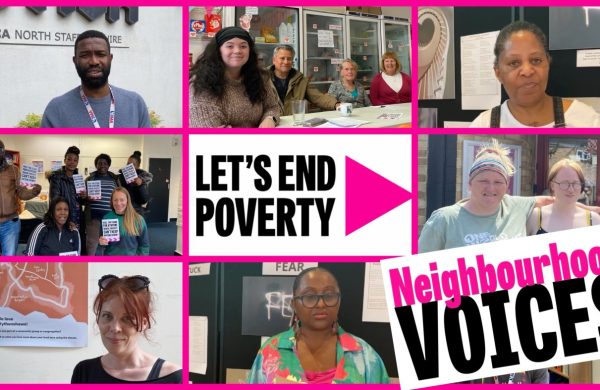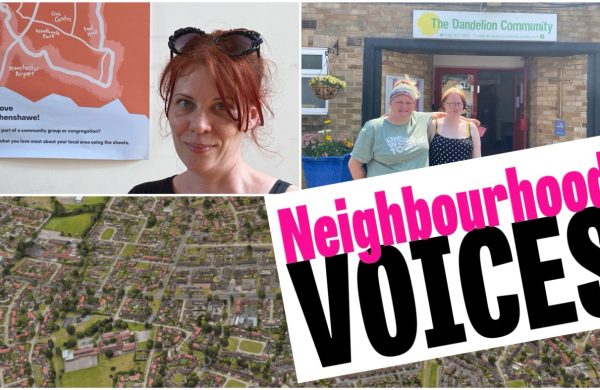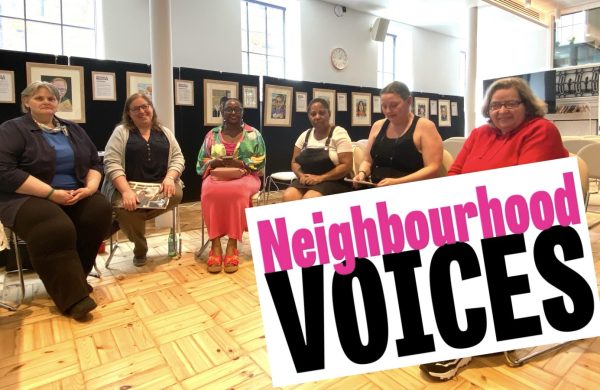Thank you Pat! 40 years of compassionate action
Pat Devlin, one of Church Action on Poverty's most experienced supporters and activists, is stepping down after almost 40 years.
Sometimes, we can see exactly where a powerful wave of change began – the single action that started the ripples that still roll.
Pat Devlin has long been involved in diverse and deeply inspiring social justice work: praying and protesting, walking and welcoming, rallying and reflecting in pursuit of a better world. She took street theatre to Tax & Benefits Centres, protested outside court, and was part of truly pioneering work to amplify the voices of people with experience of poverty.
And she can trace it all to a meeting in the early 1980s.
Pat has just stepped down as secretary of Church Action on Poverty North East (CAPNE), and spoke to us about her memories.
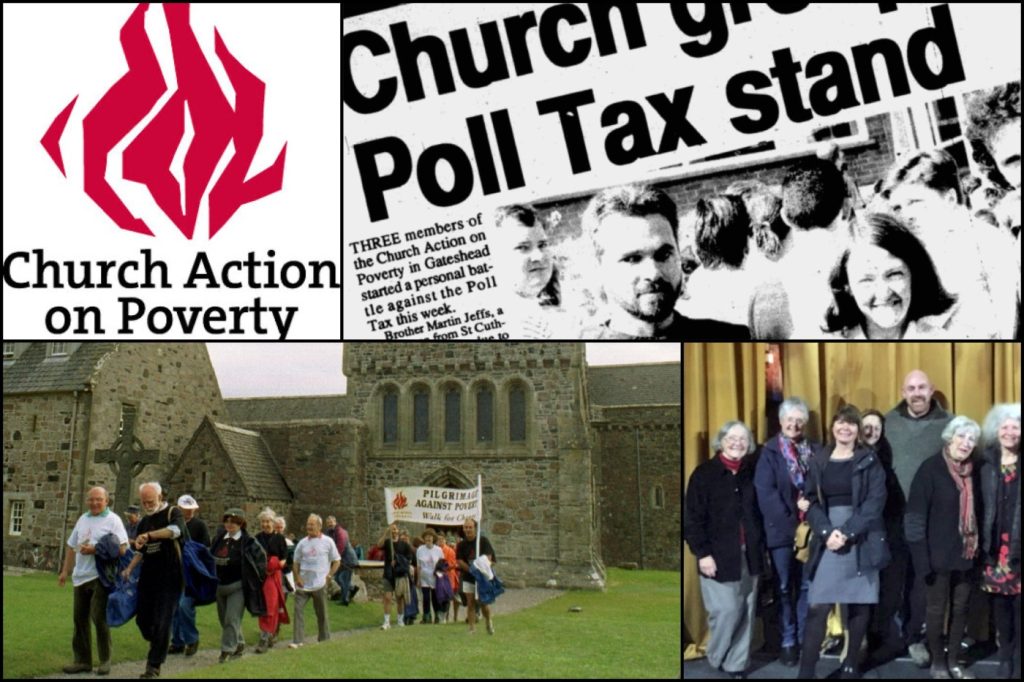
1980s Glasgow
“I was living in Glasgow at the time and I came down to one of Church Action on Poverty’s early national gatherings. I went back to Glasgow and got in touch with a few people, and we started our own group.
“We arranged for the two Liverpool bishops (Bishop Sheppard and Bishop Worlock) to come to speak in Glasgow City Chambers. We were as surprised as anyone when 500 people crowded in to hear about the Liverpool Church experience in the midst of mass unemployment!
“But that became my experience, that social justice was much more central to the churches in Scotland than I ever saw in England. Political debate was a bigger part of everyday life – almost every other Saturday, we seemed to be on a demonstration.
“The day after the Bishops had spoken, Church Action on Poverty’s national coordinator John Battle came up for a day exploring the presence of the Church on Glasgow’s peripheral estates.
“Speakers included John Miller, a Church of Scotland Minister who was bringing up his family in Castlemilk with his wife Mary who was involved in the famous Jeely Piece Club. Many years later John became the Church of Scotland Moderator. Sister Martha of the Notre Dame sisters also spoke about her small community of sisters who were living alongside people in Drumchapel, sharing people’s daily lives.”
Back to North East England
In the late 80s, Pat moved back to North East England. There had already been Church Action on Poverty groups at St Thomas’s Church in Newcastle and at Meadow Well in North Shields, but the combined CAPNE group was launched after the Dominican conference in Newcastle in 1988, entitled The Churches’ Option for the Poor.
The group focused on raising churches’ awareness, and creating networks between disadvantaged communities. An education pack was produced for churches, along with a video telling of the struggles and positive initiatives in Benwell in Newcastle, Meadow Well in North Tyneside and Willington, a former mining area in County Durham.
1990s: Protests, vigils and hearings
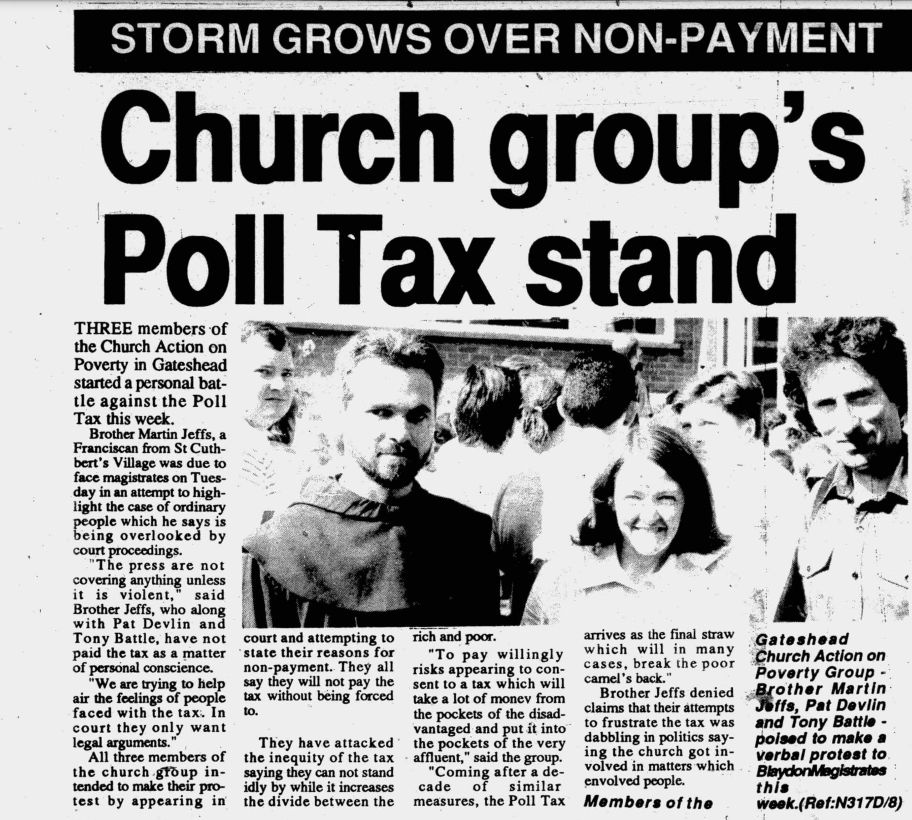
In 1990, members of CAPNE, including Pat, took an active role in protests against the court cases for non-payment of the Poll Tax.
“CAPNE had adopted a non-payment stand, and we spent what seemed like a whole summer at Blaydon Magistrates Court, holding prayer vigils before the weekly non-payment hearings.”
After the 1992 General Election, Church Action on Poverty published its Hearing The Cry Of The Poor declaration, and Pat joined the national executive for six years. Around the same time, there had been riots in the west end of Newcastle and in Meadow Well, and also changes to housing benefit, which made it difficult for people on low incomes to keep their teenagers at home.
“There was concern about a rise in youth homelessness, so CAPNE joined with Barnardos to set up the first North East Nightstop providing emergency accommodation in volunteer hosts’ homes. This was the only time CAPNE strayed into service provision.”
CAPNE organised three unemployment and poverty hearings, as part of the Local People National Voice campaign, culminating in the Gateshead Hearing in 1995. By this time, CAPNE was helping to pioneer work led by people with direct experience of poverty.
“I remember at a national gathering, people asking why there weren’t people with direct experience of poverty. One Anglican minister was very sceptical, and basically said: well, go away and bring them next time. I think David Peel in the North East led the way with meaningful engagement with people with lived experience of poverty.”
Pilgrimage against poverty
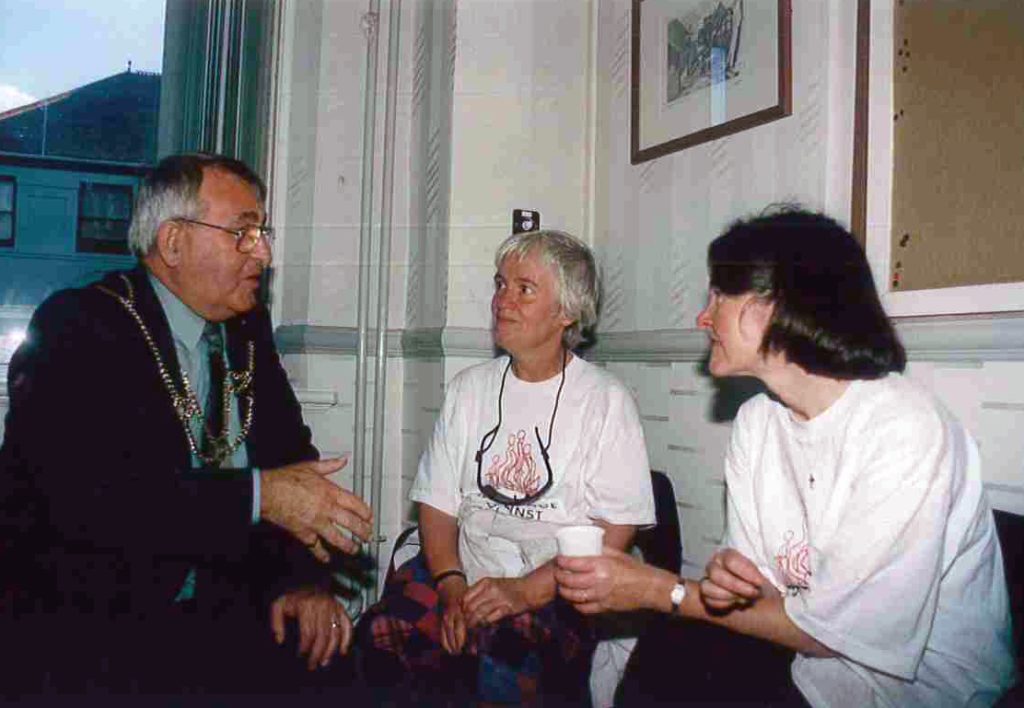
CAPNE took on two volunteers to help with the hearings, then employed Alan Thornton to help with preparations for the Pilgrimage Against Poverty in 1999, when people walked from Iona to Westminster.
“What people probably don’t know is that in the North East we initially made our own pilgrimage to Lindisfarne to explore the meaning of pilgrimage. We heard what pilgrimage meant to the Celtic church and to those who journeyed from Ireland in tiny coracles, and we gained an understanding of the Haj from an Iranian family who journeyed with us.
“I didn’t walk the whole Pilgrimage – I walked from Berwick to York, which included the memorable walk from Newcastle to Jarrow, when hundreds of local people joined us. Later I rejoined the pilgrimage in Birmingham and walked to London.
“When we reached London, after the rally in Trafalgar Square, there was a meeting with Gordon Brown, then Chancellor of the Exchequer and the North East were well represented as Brian from Meadow Well who had walked all the way from Iona, shared his experience as a young unemployed man and I was asked to present some of the policy changes we were looking for in particular a minimum income standard which came from the poverty hearings.
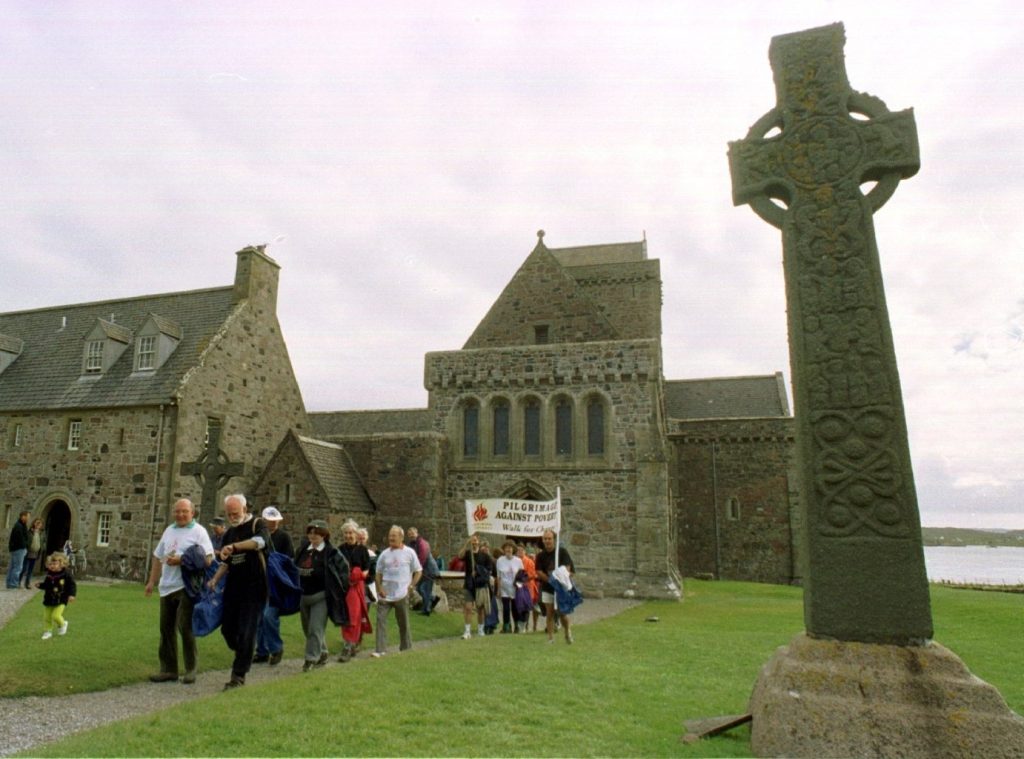
The 2000s: Images For Change
For the Images For Change project in 2007/8, CAPNE worked with disadvantaged local communities, using photogaphs to explore the impact of regeneration projects and to push for local people to be listened to.
Five communities were allocated their own budget and used it in different ways, leading to diverse and vibrant local events, then a big event at Gateshead Civic Centre, when they
presented their shared key issues to local political leaders and regional representatives of
central Government.
“They went on to steal the show at an event for the then Communities Secretary Hazel Blears. However, when I meet people who participated, it’s not the big events or even the boat trip down the Tyne giving a different perspective on their communities and ending in a hooly on the boat, that they talk about.
“What they talk about is the visits to other communities in Manchester and Glasgow who had gone through similar experiences of ‘regeneration’.”
Making The Economy Work For Everyone
“This was the next big initiative to bring disadvantaged communities together to find a stronger voice in their shared experience. This time it was across the North of Tyne Authority, to give a platform to people whose experience is of exclusion, so they could explain the barriers accessing training and employment and a decent income that they faced. Much of the process leading to this event took place during COVID so it was an uphill struggle, but in the end it was a powerful event.
“I think what the Pilgrimage, Images for Change and Making the Economy work for Everyone show is just how hard it is to maintain the momentum and achieve demonstrable policy changes. It can be difficult – people retire, whole departments disappear, and we once had a meeting scuppered by a fire alarm that lasted the whole meeting.
“Abortive meetings can kill the enthusiasm of community participants and in the end our energy and capacity. We live in hope that attitudes have or are changing! I think Debt on The Doorstep was one clear success in terms of being able to demonstrate policy change.
“But this work is central to the church’s role, to the gospel call to be alongside the poorest. Whether we see change immediately or not, we need to keep going.
“We can certainly see a lot of tangible changes that have happened at local level, even if it is harder to see them at national level, but national charities like Church Action on Poverty can only work at local level through existing organisations that are already embedded locally.”
Keeping people connected
Between the big initiatives, CAPNE engages churches through creative events for Church Action on Poverty Sunday; inviting topical speakers to AGMs; taking display boards to events; and promoting courses such as Scripture at the Margins.
Pat also remembers fondly the Happier Christmas movement, led by the Franciscans and accompanied by a CD song that Tony Blair contributed to; taking part in participatory budgeting in Newcastle; the Journey to Justice event using the anniversary of Martin Luther King’s visit to Newcastle to highlight areas of injustice; and supporting the Gateshead and North of Tyne Poverty Truth Commissions.
A welcoming place
Amid all the work, CAPNE has also been a cherished community itself.
“There was so much energy in the 1980s, that I think got lost a bit in the 90s and 00s – but it does seem to be coming back now,
“I think also, sometimes people who struggled to find like-minded people in their own congregations have found a spiritual home in CAPNE. It has been a place where they could share their faith and hope of building a society which reflects Gospel values reflecting the ‘kingdom’ we aspire to and find ways of supporting each other acting together in accordance with that.”

